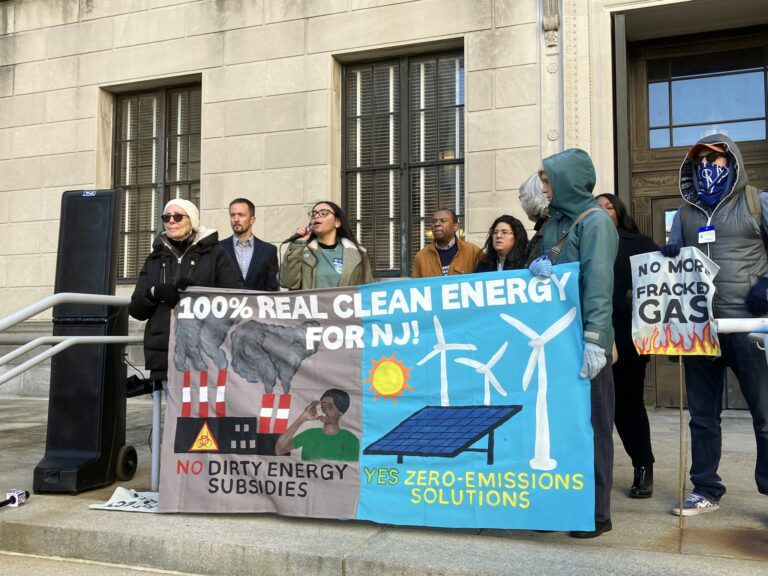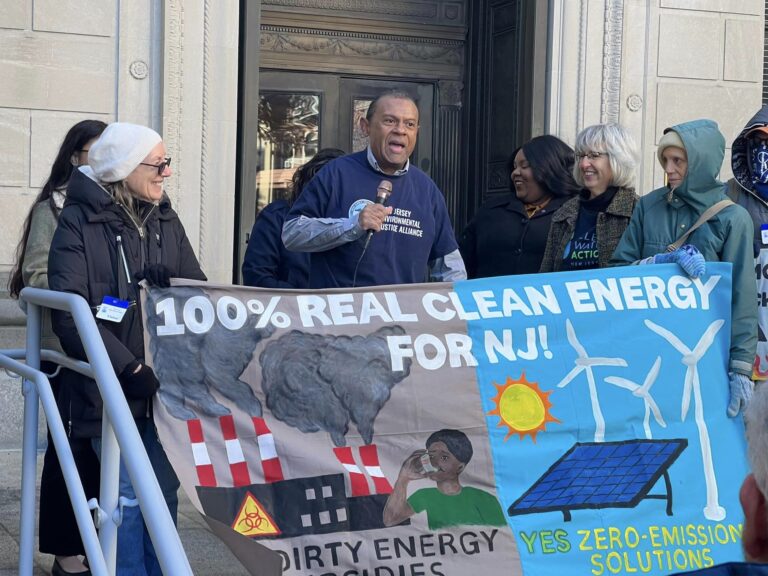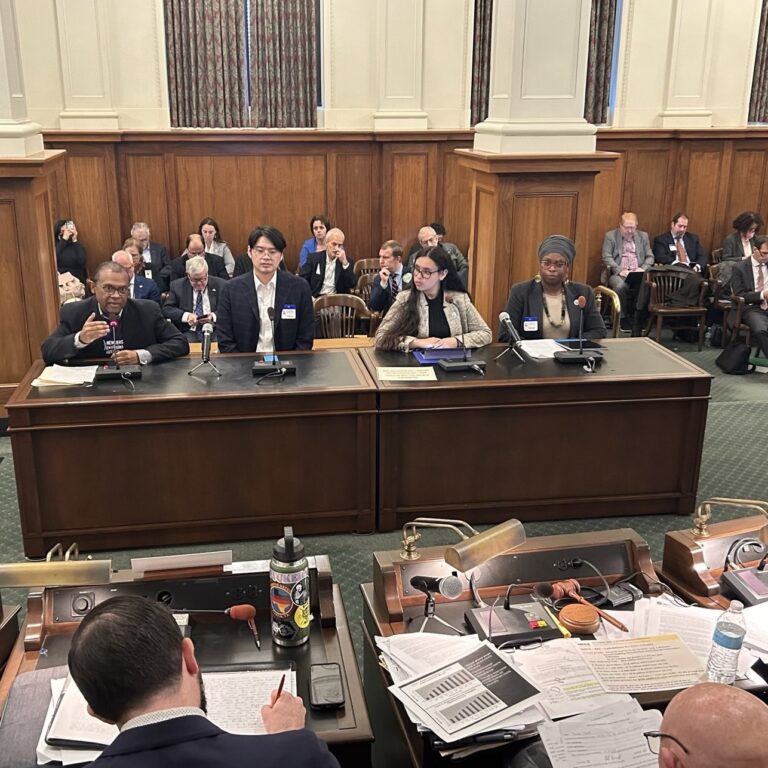Questions at the MACH2 April 10 Listening Session
The New Jersey Environmental Justice Alliance has raised significant questions to the MACH2 engagement team both via email and at the April 10 MACH2 Listening Session. During the April 10 Listening Session, our team sent in questions via chat. Due to the number of participants, only one person from NJEJA was put onto the speaking list which was created and shared by OCED prior to the event.
We raise these questions out of deep concern and love for our community. The life cycle of hydrogen production is not only costly and economically inviable, but has not been proven safe for our communities. In fact, in many instances, demonstration tests for hydrogen projects have proved to be dangerous, unsustainable, and not effective projects. Furthermore, regardless of whether or not the hydrogen produced is “green” (I.e. hydrogen theoretically created from entirely renewable technology), it poses the same risks during transportation, storage, and end use as hydrogen created from fossil fuels.
In an effort to increase transparency and get these questions answered, please see the concerns that NJEJA has raised to the MACH2 team regarding the structure, function, intention, and infrastructural development of the MACH2 project.
Questions for the MACH2 Community Engagement Team
The New Jersey Environmental Justice Alliance has raised significant questions to the MACH2 engagement team both via email and at the April 10 MACH2 Listening Session. We are deeply concerned about the level of community engagement and the claim of community benefits agreements without significant investment, input, and consent from the communities who will host this infrastructure.
It is imperative that organizers for the hub consider the input of host communities, which are primary Environmental Justice communities and frontline communities who are already significant burdened by pollution and negative air quality. We call upon OCED and hub organizers to honor the community’s right to exercise free, prior and informed consent as well as their right to refuse, by providing transparent and robust information.
In an effort to increase transparency and get these questions answered, please see the concerns that NJEJA has raised to the MACH Community Engagement team regarding the logistical development of this process.
Environmental Justice Advocates Testify in Trenton on the Proposed Clean Energy Standard
Comments to the Dept. of Treasury on Credits for Hydrogen Production
To date, climate change mitigation policy has typically been carbon-centric and focused solely on reducing carbon emissions. We urge the 45(v) tax credit proposed rule to move away from carbon centrism by addressing EJ issues that include limiting the emissions of GHG co-pollutants in general as much as possible.
A carbon centric approach and focus on solely using the lifecycle GHG emissions rate of hydrogen production as the metric to determine whether the hydrogen produced is “clean”, is a significant EJ concern. This approach ignores the emissions of GHG co-pollutants along the life cycle of not just hydrogen production but storage, delivery and end uses (such as the burning of hydrogen-blended natural gas at power plants3). Additionally, when a life cycle GHG emissions rate is the sole metric to determine whether the hydrogen produced is clean, a myriad of environmental and health impacts along the hydrogen production chain remain insufficiently addressed.
NJEJA Celebrates Success of Inaugural Offshore Wind Training Program
It’s Time We Put an End to the Carbon Capture Farce
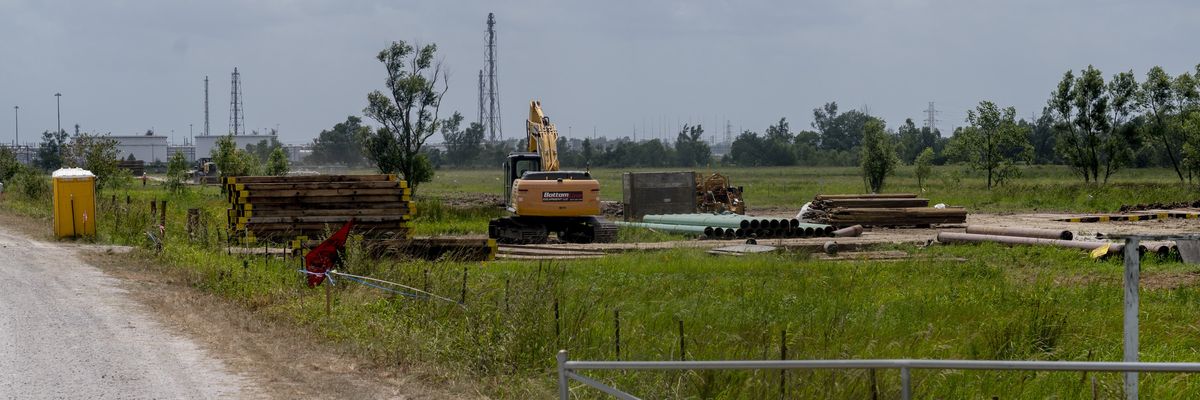
Motiva, another plant involved with a carbon capture project, lays out new built pipes in Donaldsonville, Louisiana, on June 19, 2023. (Photo: Emily Kask for the Washington Post)
This article was originally published by Common Dreams on November 14, 2023.
By: Ana Baptista, Dana Johnson
The transition away from fossil fuels is an urgent necessity, but we must ensure that renewable energy development doesn’t leave anyone behind. Environmental justice communities need real change – not a rebrand of the same discriminatory plans that slow the clock on fighting the climate crisis and reinforce the status quo.
There is a heightened focus on justice and equity in the Biden administration—but what does that look like for communities living with the realities of systemic and institutionalized discrimination?
For generations, environmental justice communities have borne the brunt of policies and practices that have relegated our homes, workplaces, recreational spaces, and places of worship to the shadows of fossil fuel and petrochemical infrastructure. As the administration and lawmakers advance opportunities to “decarbonize” the energy sector—the largest source of climate change-causing greenhouse gases in the U.S.—many communities are given little insight into the plans and technologies marketed as the solution. As a result, environmental justice communities—those predominantly composed of people of color and those with low income—have to navigate a maze of new federal investments in obscure policies and plans.
Specifically, carbon capture and sequestration (CCS), utilization (CCUS), hydrogen hubs, and direct air capture projects are being rolled out without transparency and our communities are targeted as development zones. It’s time for real change—not a rebrand of the same discriminatory plans that slow the clock on fighting the climate crisis and reinforce the status quo.
While CCS is being pushed as a way to cut emissions, it’s actually enabling further fossil fuel reliance.
The emergence of carbon management initiatives, including the Environmental Protection Agency’s (EPA) latest carbon rule proposal in tandem with the Department of Energy’s (DOE) regional hydrogen hub plan, are a major part of the problem. These initiatives are based on the promise of siphoning off greenhouse gas emissions from power plants and industrial facilities, but they often rely more on greenwashing and wishful thinking than on real solutions. They divert focus from the critical need to break free from fossil fuels, such as coal and natural gas, that disproportionately burden environmental justice communities.
The reality is that CCS technology remains untested at scale, is not guaranteed to work, and won’t address other harmful pollution like particulates that wreak havoc on our communities. In fact, “…more than 95% of all deployed CCS capacity has been used for enhanced oil recovery (‘EOR’), the process of taking captured carbon dioxide (CO2) and injecting it back into depleted oil wells to further extract more fossil fuels.”
While CCS is being pushed as a way to cut emissions, it’s actually enabling further fossil fuel reliance. What’s even more infuriating is that these projects are poised to reap the benefits of federal tax credits bolstered by the Inflation Reduction Act of 2022. This is a con job on the American public that will funnel funds into risky projects ultimately helping fossil fuel companies and perpetuating the systems that caused the climate crisis.
Now, CCS, CCUS, and direct air capture, along with certain types of hydrogen hubs using CCS along with natural gas, are planned for locations already overburdened by heavy industry, imposing additional risks such as leaks, pipelines blowing up, and health-harming air pollution like nitrogen oxide emissions. Unfortunately, a staggering 90% of the proposed or existing CCS/CCUS plants are located in or dangerously close to EJ communities. This means that investments in these risky schemes will inflict more damage on those already most vulnerable to pollution and climate change for years to come. Louisiana alone faces over two dozen proposals for CCS, CCUS, and hydrogen projects.
If these energy plans move forward, EJ communities will again be collateral damage.
One of these is a colossal $4.5 billion hydrogen plant and carbon capture complex in Ascension Parish by Air Products. This project includes carbon pipelines, wells, and underground storage that pose a grave threat to Lake Maurepas and contribute to air pollution from the new CCS plant, along with the real possibility of explosions. To make matters worse, project applicants may only carry liability for 10 years instead of the usual 50, leaving one of the poorest states with potential liabilities indefinitely.
Federal agencies promise new “regulatory regimes,” to protect EJ communities, but all we see in response to our concerns is an offering of community benefit agreements and public engagement processes that lack substantial, enforceable protections or the right to say “no.” In the absence of concrete federal protections, speculative industry proposals will capitalize on generous federal incentives like the 45Q and 45V tax credits, which allow upfront benefits without a clear mechanism by which governments will oversee and ensure the permanent storage of CO2. Likewise, the Inflation Reduction Act lengthened application timelines and opened up the criteria for which CCS projects qualify. And when disasters hit, we’ll all pay the price through skyrocketing healthcare and housing costs, along with other rising costs linked to pollution and the climate crisis. This approach not only rewards the industries that drive climate change and pollution in EJ communities, but it also perpetuates the big scam of oil, gas, and petrochemical giants.
It’s time we put an end to this farce.
EJ communities were given promises for real investment and involvement in a just energy transition through the administration’s Justice40 Initiative that would not mirror prejudicial policies of the past. If these energy plans move forward, EJ communities will again be collateral damage. There are sustainable solutions that desperately need our support and funding, including transitioning to truly clean, renewable energy such as wind and solar with an equitable transmission build-out.
We have what we need to do right by EJ communities nationwide, and to stave off the worst of the climate crisis before it’s too late—it’s time to move in the right direction.
Environmental Justice Advocates Rally in Trenton to Push for Real Clean Energy Policy
Orsted Canceling Offshore Wind in New Jersey is Bad News, But Not the End of the Story
This article was originally published by The Philadelphia Inquirer on November 3, 2023.
By: Brooke Helmick, Melissa Miles
The transition away from fossil fuels is an urgent necessity, but we must ensure that renewable energy development doesn’t leave anyone behind.
On Tuesday, the offshore wind developer Orsted announced that it had decided to scrap both of its New Jersey projects, citing rising interest rates and supply-chain problems. The projects, combined, would have powered over 1.6 million homes and were part of Gov. Phil Murphy’s plan to address climate change.
But this setback is by no means the end of renewable energy in the Garden State. In order to ensure a full and just transition to clean energy technologies, New Jersey must continue to prioritize the economic stability and well-being of communities that have been historically sidelined from the benefits of energy development.
Job training is among the most important outcomes of any potential renewable energy project.
Our organization, the New Jersey Environmental Justice Alliance, works with communities that have been disproportionately exposed to and negatively impacted by hazardous pollution and industrial practices. This includes Newark, Camden, Edison, and Bayonne, which are close to waste incinerators, power plants, Superfund sites, and other highly toxic sources of pollution.
In June, we joined the first cohort of community-facing organizations to receive workforce development grants as part of the New Jersey Economic Development Authority’s offshore wind initiative. We worked to help inform the process of introducing offshore wind in a manner that centered, or at least included, communities that are currently hosting power plants and refineries. These communities have been historically cut out of important conversations and initiatives like this one.
Within these meetings, we as an environmental justice organization worked to reframe the conversation around the immediate needs and risks of overburdened communities. These projects were one avenue for ensuring that New Jersey residents traditionally impacted by toxicity and pollution were no longer just the victims of bad policy, but active participants and the protagonists in the story of what comes next.
In the pursuit of a just transition away from fossil fuels, we must continue to ensure that the transition to clean energy does not leave people behind. As made visible by the New Jersey Environmental Justice Mapping, Assessment, and Protection Tool, areas such as Newark, Camden, Edison, and Bayonne are among the overburdened communities consistently at risk.
The question of economics weighs heavily for environmental justice advocates as we seek to work with allies and state agencies to bring clean technologies to our state, while simultaneously ensuring that we do not replicate the current systems of economic imbalance. We cannot and must not sacrifice the economic stability of our environmental justice communities while we develop long-term green technology options.
When picturing offshore wind, cities like Newark, Elizabeth, Rahway, and Camden may not immediately come to mind. However, these cities are either the sites of health-harming energy infrastructure, polluting ports, or both. These same communities, and others like them, have borne the burdens of keeping the state and the region running without seeing many benefits.
Understanding that the prospect of mega wind farms off the coast presented challenges, specifically to some of the communities at the Shore, we knew it would be doing fossil energy-impacted communities a disservice if we did not enter into the conversation.
Offshore wind is never going to be a singular, all-encompassing solution, but it does provide environmental justice communities an opportunity to be active participants in building safer, healthier, and more sustainable communities. Offshore wind offers not only a greener, cleaner technology than fossil fuels but also the potential for job investment in communities that have historically faced economic disadvantages and financial hardships.
Orsted’s announcement this week came not only as a surprise but as a disappointment. As the Murphy administration considers other renewable energy projects, it is imperative that state leaders are intentional about equally distributing both the benefits and risks of transitioning to new technologies.
The transition away from fossil fuels is an urgent necessity, but we must ensure that the choices we make today — which will continue to impact future generations — are ones that don’t leave anyone behind.
One solution is not going to fix climate change. One setback won’t stop climate action, either.
NJEJA Offers Wind Energy Job Training for Residents in Overburdened Communities
This article was originally published by Real NJ on November 1, 2023.
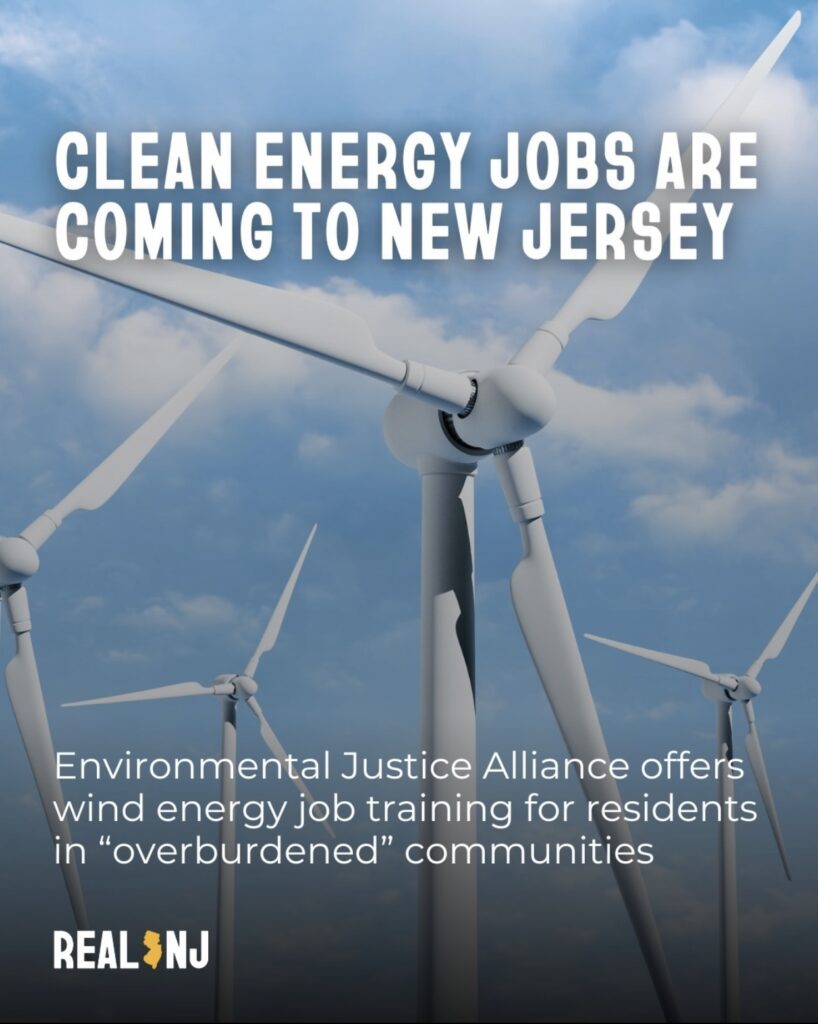
The New Jersey Environmental Justice Alliance @njejalliance is teaming up with Soulful Synergy @_soulfulsynergy_ and the Newark Workforce Development Board to bring offshore wind workforce development training programs to New Jersey residents in the greater Newark area, and other overburdened communities in the state.
New Jersey is expected to rely more on offshore wind power for its energy needs in the coming years. Governor Murphy set clean energy milestones for the state with the goals of reaching 100% clean energy by 2050, and increasing New Jersey’s previous offshore wind energy goal by nearly 50 percent to 11,000 megawatts (MW) by 2040.
Halimah Shabazz with NJEJA says overburdened communities don’t have the same protection from climate change as other communities leaving them vulnerable to “disparities in experiencing more extreme weather events like flooding or extreme heat because of things like low tree cover…”
“I would say this training is a stepping stool. Sometimes, people don’t go for certain types of jobs especially when they see requirements like OSHA 30, which isn’t a free training. So we are providing this training for free to our participants and they are gaining a stipend for their time and commitment at the end of the program,” said Shabazz.
With increased demand for wind power, more clean energy jobs are also coming to New Jersey over the next 3-5 years, says Shabazz. NJEJA wants those from overburdened communities to know about what skills are required so that they can apply for those jobs.
The goal of the training program is to make sure the communities most impacted by climate change and pollution are able to benefit from New Jersey’s transition to clean energy solutions, by “setting people up to be able to get other construction jobs or even learning or putting themselves in a great position to have a job that requires specific skills,” says Shabazz.
In the six-week training program development training, participants can expect to learn where to look and apply for the jobs, resume help, hands-on construction skills training, site safety, which is really important on a construction site. They are also going to get OSHA 30 certification, which is one of the concrete things that you need when you’re going into a construction job, and learning about the fundamentals of offshore wind structures.
“One of the critical pieces for this training is the Environmental Justice 101 training. So if you’ve never heard of “overburdened”, if you’ve never heard of “environmental justice”, it gives people an opportunity to learn about what, what these things are, how they’re impacted, and then seeing how gaining this training and connecting it with environmental justice is actually extremely beneficial for them,” says Shabazz.
The kinds of jobs that will be available will vary from installation and commissioning turbine manufacturing, operations, maintenance, project management and development, and balance of plant manufacturing.
NJEJA plans to hold 3 trainings with 20 participants each for a total of 80 participants trained. Participants must be from a designated overburdened community, who typically wouldn’t have access to these jobs, as determined by the New Jersey Department of Environmental Protection.
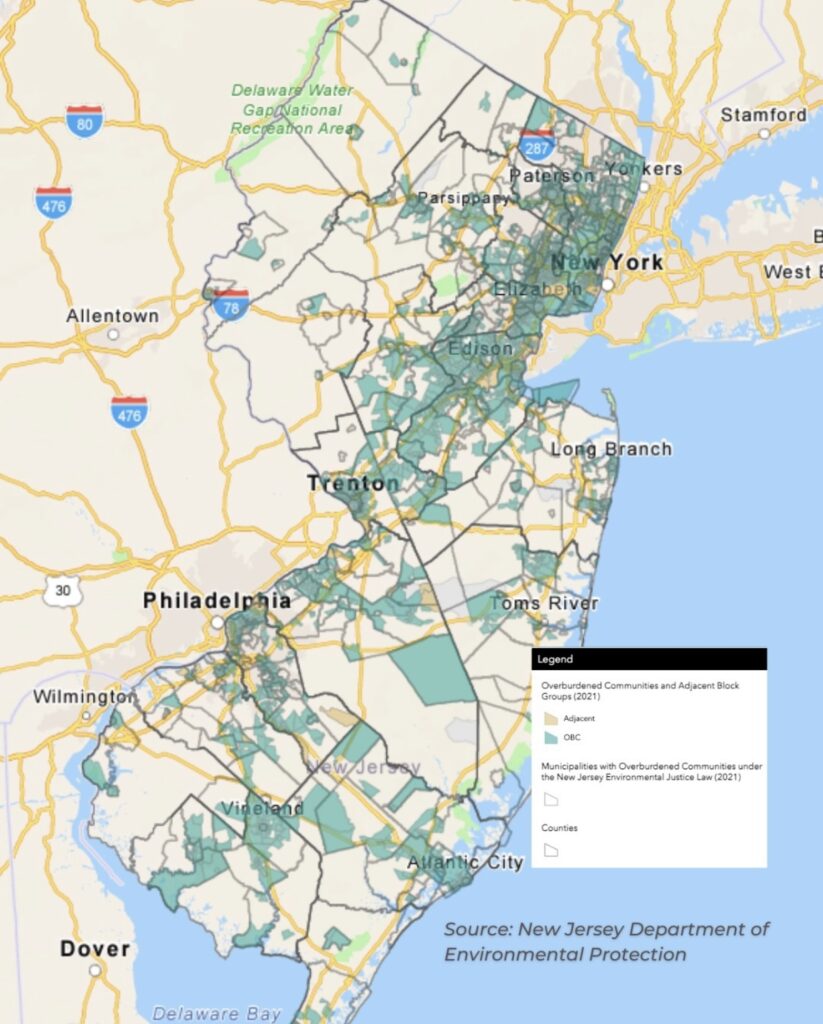
Participants must be 18 years of age and older. You must first attend an information session in order to have your application for the training program considered. Residents interested in the training can follow @njeja to learn more.



